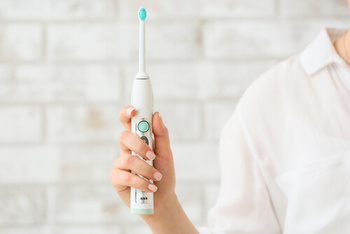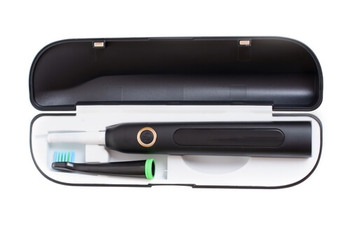Investing in the right electric toothbrush is crucial for maintaining good oral health. In this comprehensive guide, we’ll explore the pitfalls of opting for a cheap electric toothbrush and why prioritising quality is essential.
From the types of electric toothbrushes to the risks associated with neglecting the quality of your toothbrush, we’ll cover everything you need to make an informed decision about your oral care.
Why Cheap Electric Toothbrushes Aren’t Worth The Bargain
While the allure of a low price tag may be tempting, cheap electric toothbrushes often come with significant drawbacks.
These budget-friendly options might compromise crucial features like brush head quality, cleaning modes, and durability.
In the long run, these compromises can negatively impact your dental health.
Let’s delve into the specific reasons why cheap electric toothbrushes may not be the best investment for your oral care routine.

- Compromised Brush Head Quality: Low-cost electric toothbrushes often feature subpar toothbrush heads, compromising their ability to effectively remove plaque and safeguard oral health. Opting for toothbrushes with superior, high-quality brush heads ensures a thorough cleaning experience, reducing the risk of plaque buildup and potential dental issues.
- Reduced Durability: Bargain toothbrushes may sacrifice durability, resulting in a shorter lifespan and diminished performance over time. Choosing an electric toothbrush with a robust build ensures longevity, consistent brushing efficacy, and a reliable tool for maintaining oral hygiene.
- Inconsistent Performance: Some inexpensive electric toothbrushes may suffer from inconsistent performance and shorter battery life. Investing in a toothbrush with reliable battery longevity ensures uninterrupted use, promoting effective cleaning during each brushing session.
- Basic Features Only: Cheap electric toothbrushes often lack advanced features found in premium models, such as pressure sensors or smart connectivity. Opting for a toothbrush with advanced features enhances safety, effectiveness, and the overall user experience, contributing to better oral health outcomes.
While the affordability of cheap electric toothbrushes might be appealing initially, their compromises in key areas can impact your dental health in the long term.
Investing in a higher-quality electric toothbrush ensures superior performance, durability, and advanced features that contribute to a more effective and personalised oral care routine.
How Your Choice Of Electric Toothbrush Influences Your Dental Health
Your toothbrush plays a pivotal role in maintaining optimal dental health.
In this section, we’ll discuss the various factors to consider when choosing an electric toothbrush.
From bristle type to brushing modes, understanding how your toothbrush choice affects your oral hygiene is crucial for making an informed decision.
- High-Quality Bristles: Selecting an electric toothbrush with top-notch, soft bristles is crucial for avoiding enamel and gum damage. Quality bristles ensure effective plaque removal without causing harm, contributing to a gentle yet thorough cleaning experience.
- Multiple Brushing Modes And Replacement Brush Heads: A premium electric toothbrush offers various brushing modes, and replacement heads catering to specific oral health needs. This versatility allows users to tailor their brushing routine, addressing concerns like sensitivity or focusing on gum care, leading to a more comprehensive and personalised oral care experience.
- Durable Build: The importance of a sturdy build cannot be overstated. A durable electric toothbrush minimises malfunctions, ensuring consistent and reliable performance throughout its lifespan. This durability is key to maintaining a high standard of oral care over the long term.
- Reliable Battery And Performance: An electric toothbrush with a dependable battery and consistent performance guarantees uninterrupted use. This reliability is vital for effective cleaning during every brushing session, contributing to optimal oral health outcomes.
- Compatibility With Your Individual Needs: The right electric toothbrush aligns with your individual oral health needs, considering factors like existing dental conditions, sensitivity levels, and specific treatment plans. Choosing a toothbrush that caters to your unique requirements ensures a personalised and effective approach to oral care.
Exploring Electric Toothbrush Types: Which One Suits You?
Electric toothbrushes come in various types, each offering unique advantages.
From sonic toothbrushes to rotating-oscillating brushes, we’ll explore the pros and cons of different electric toothbrush types.
Understanding these distinctions will help you make an informed choice that aligns with your oral care needs.
Sonic Toothbrushes
- Overview: Sonic toothbrushes employ high-frequency vibrations, generating sonic movements that drive fluids between teeth and along the gum line.
- Advantages:
- Effective plaque removal goes beyond bristle contact.
- Enhanced gum stimulation through fluid dynamics.
- Ideal for those seeking a thorough and dynamic cleaning experience.
- Considerations:
- Potential sensitivity for users not accustomed to sonic vibrations.
- Higher price point compared to basic electric toothbrushes.
Rotating-Oscillating Brushes

- Overview: Rotating-oscillating brushes feature small, round heads that oscillate back and forth, providing targeted and precise cleaning.
- Advantages:
- Clinically proven to be highly effective in plaque removal.
- Well-suited for users with orthodontic appliances or dental work.
- Offers a reliable and systematic cleaning approach.
- Considerations:
- It may not appeal to individuals who prefer a gentler brushing experience.
- Bulkier design compared to sonic toothbrushes.
Dual-Head Electric Toothbrushes
- Overview: Dual-head electric toothbrushes combine oscillating and vibrating motions in one device, aiming to provide comprehensive cleaning.
- Advantages:
- Offers a versatile and multi-faceted cleaning approach.
- Suitable for individuals with varying oral care needs.
- Provides a balance between thorough cleaning and user comfort.
- Considerations:
- The complexity of dual heads may necessitate adaptation for some users.
- It may have a slightly steeper learning curve compared to single-head options.
Rotary Electric Toothbrushes
- Overview: Rotary brushes feature circular brush head movements, offering a distinct method for plaque removal.
- Advantages:
- Effective in reaching areas that may be challenging for manual brushing.
- Provides a circular motion that can be gentler on gums.
- Suitable for those seeking an alternative to oscillating designs.
- Considerations:
- Users may take some time to adjust to the circular brushing motion.
- It may require more extensive coverage due to the size of the circular brush head.
Counter-Oscillating Electric Toothbrushes
- Overview: Counter-oscillating brushes boast tufts of bristles that rotate in opposite directions simultaneously.
- Advantages:
- Targeted cleaning action is particularly beneficial for reaching interdental spaces.
- Suitable for users with specific dental concerns requiring precise cleaning.
- Efficient plaque removal in hard-to-reach areas.
- Considerations:
- The counter-oscillating motion may feel different from traditional brushing techniques.
- It may require slight adjustments to ensure optimal use.
Navigating the diverse landscape of electric toothbrush types allows you to align your oral care routine with a device tailored to your preferences and specific dental needs.
Whether you prioritise dynamic sonic movements, targeted oscillation, or a combination of both, the right electric toothbrush type can be a game-changer in your quest for optimal oral health.
The Dangers Of Neglecting Your Toothbrush Quality
Neglecting the quality of your toothbrush can have severe consequences for your oral health.
This section will delve into the risks associated with using subpar brushes, including the potential for bacterial growth, ineffective plaque removal, and compromised gum health.
Learn why investing in a high-quality toothbrush is a fundamental step towards a healthy smile.
The Hidden Threat: Bacterial Breeding Grounds
Neglecting your toothbrush’s quality opens the door to a breeding ground for harmful bacteria.
Subpar brushes may harbour microbes, leading to oral infections and compromising overall mouth health.
Plaque Plight: Ineffective Plaque Removal
Effective plaque removal is essential for good oral hygiene, but using brushes of inferior quality may hinder this crucial process.
Substandard toothbrushes might struggle to reach and eliminate plaque effectively, paving the way for dental problems like cavities and gum disease.
Gum Woes: Compromised Gum Health
Gum health is a cornerstone of overall oral well-being, and it can suffer significantly when toothbrush quality is overlooked.
Abrasive or poorly designed bristles may cause irritation, leading to inflammation and potential recession.
Inconsistent cleaning can contribute to plaque buildup along the gum line, fostering gingivitis and other periodontal issues.
The Holistic Solution: Investing In Quality
Investing in a high-quality toothbrush goes beyond routine oral care; it becomes a foundational step in cultivating and preserving a radiant, healthy smile.
The ramifications of neglecting toothbrush quality underscore the importance of choosing a tool that not only meets your oral needs but also ensures the longevity and vitality of your teeth and gums.
Weighing The Options: Manual Brush Vs. Electric Toothbrushes
In this section, we’ll compare the effectiveness of a manual toothbrush with its electric counterparts.
Dispelling common myths, we’ll emphasise the importance of proper brushing techniques and why opting for a budget-friendly electric toothbrush may not necessarily provide superior results.

Manual Brushes: Navigating The Downsides
- Inconsistent Brushing Techniques: One of the fundamental challenges with manual brushes lies in the inconsistency of brushing techniques. Users often struggle to maintain the correct angle, pressure, and coverage, leading to suboptimal plaque removal.
- Inefficiency In Plaque Removal: The reliance on manual dexterity sometimes results in inefficiencies in plaque removal. Hard-to-reach areas may be neglected, contributing to the persistence of plaque and the potential development of oral health issues.
Rising Above Limitations: The Triumph of High-Quality Electric Toothbrushes
- Consistent And Optimal Brushing: The automated nature of electric toothbrushes ensures a consistent brushing experience. With features like built-in timers and pressure sensors, users are guided through the recommended two-minute brushing time with even pressure, promoting thorough and effective cleaning.
- Enhanced Plaque Removal: Powered by advanced technologies, electric toothbrushes excel in plaque removal, reaching areas that manual brushes may overlook. Oscillating, rotating, or sonic motions contribute to a comprehensive cleaning, reducing the risk of plaque-related dental problems.
In navigating the landscape of dental tools, the limitations of manual brushes become apparent.
Investing in a high-quality electric toothbrush emerges not merely as an option but as a strategic move towards overcoming these limitations, embracing technological advancements, and elevating the standard of oral care.
Elevating Your Dental Health: The Profound Impact Of Your Toothbrush Choice
Embark on a journey where your toothbrush is not merely a tool but a catalyst for enhanced dental and psychological well-being.
This section transcends the technical features of toothbrushes, focusing on the broader benefits that resonate through your oral care routine.
Dental Benefits: Nurturing Oral Harmony
- Gum Health Preservation: Optimal toothbrush selection nurtures gum health, mitigating the risk of gingivitis and periodontal issues. Soft bristles, tailored brush head size, and ergonomic design collectively create an environment where your gums thrive.
- Precision In Cleaning: Tailored brush head sizes enhance precision, allowing you to target specific areas with ease. This precision is not just about clean teeth but a mindful approach to your dental health, promoting a sense of accomplishment with every thorough brushing session.
Psychological Benefits: Crafting A Positive Oral Ritual
- Comfort And Enjoyment: An ergonomically designed toothbrush provides comfort during brushing, transforming it from a mundane task into an enjoyable ritual. The tactile satisfaction of a well-designed handle elevates your brushing experience, fostering a positive association with oral care.
- Consistency And Routine: A toothbrush that aligns with your preferences encourages consistent oral care routines. The daily ritual of brushing becomes a cornerstone habit, instilling discipline in your approach to dental health. Consistency is not just a dental virtue but a psychological one, creating a sense of order and accomplishment.
- Confidence In Oral Care: Knowing you’ve chosen a toothbrush that caters to your unique needs instils confidence. This confidence transcends the physical act of brushing, radiating into your overall well-being. It becomes a subtle yet powerful affirmation of your commitment to self-care.
As you reflect on your toothbrush choice, envision it as more than a practical object. It becomes a partner in your journey towards dental health and a subtle architect of positive psychological associations.
The profound impact stretches beyond the physical benefits, creating a symphony where dental and psychological well-being harmoniously converge.
Navigating The Options: A Guide To Choosing The Right Toothbrush
Selecting the right toothbrush transforms your daily oral care routine into a personalised and effective ritual.
This section transcends the mere act of choosing a toothbrush, diving into the intricate details that cater to individual preferences, oral health needs, and the evolving landscape of technological features.
Bristle Softness: The Gentle Touch
- Soft Bristles For Sensitivity: If you have sensitive gums or teeth, opt for a toothbrush with soft bristles. This gentle touch ensures thorough cleaning without irritating, making your brushing experience comfortable and soothing.
- Medium Bristles For Versatility: Those seeking a balance between effective cleaning and a gentle touch might find medium bristles suitable. This choice caters to a broader spectrum of oral health needs, offering versatility in plaque removal.
- Hard Bristles For Robust Cleaning: If you require more robust cleaning and have resilient gums, toothbrushes with hard bristles might be appropriate. However, it’s crucial to use hard-bristled brushes with caution, as they can potentially cause damage to gums and enamel if not used correctly.
Handle Grip: Ergonomics For Comfort
- Ergonomic Design For Comfort: Choose a toothbrush with an ergonomic handle design that complements the natural contours of your hand. This feature enhances comfort during extended brushing sessions, ensuring a secure grip and optimal control.
- Non-Slip Grip For Practicality: For those who prioritise practicality, a toothbrush with a non-slip grip is advantageous. This feature ensures a steady hold, even when hands are wet, adding a layer of safety to your daily oral care routine.
Additional Features: Technological Allies
- Brushing Timers For Precision: Toothbrushes equipped with built-in timers assist in maintaining the recommended brushing duration of two minutes. This feature ensures you devote adequate time to each quadrant of your mouth, fostering a disciplined brushing routine.
- Pressure Sensors For Protection: Advanced toothbrushes incorporate pressure sensors that alert you if you’re applying excessive force during brushing. This protective feature prevents potential damage to gums and enamel, promoting mindful brushing habits.
- Cleaning Modes For Versatility: Explore toothbrushes with multiple cleaning modes tailored to specific oral care needs. From sensitive cleaning modes to intense plaque removal, these versatile options allow you to adapt your brushing routine based on daily requirements.
As you embark on the quest for your perfect toothbrush, envision it as an extension of your oral care journey.
Consider the nuances of bristle softness, the embrace of the handle grip, and the technological allies that elevate your brushing experience.
Taking these points into consideration empowers you to navigate the myriad options, ensuring the chosen toothbrush becomes a seamless companion in your pursuit of optimal oral health.
Frequently Asked Questions
Are cheap electric toothbrushes effective?
Cheap electric toothbrushes may seem like a cost-effective option, but their effectiveness can be compromised. These brushes often lack essential features found in higher-quality models, such as advanced cleaning modes, a pressure sensor, and a durable brush handle and head. Investing in a high-quality electric toothbrush ensures superior plaque removal and overall oral care.
How often should I replace the brush head of my electric toothbrush?
It’s recommended to replace the brush head of your electric toothbrush every three to four months or sooner if bristles show signs of wear. This ensures optimal cleaning performance and prevents the accumulation of bacteria on the brush head. Regular replacement is crucial for maintaining effective oral hygiene.
What features should I look for in a high-quality toothbrush?
A high-quality toothbrush should have features like soft bristles for gentle cleaning, an ergonomic handle for comfortable grip, and additional features such as a brushing timer and pressure sensors. These elements contribute to a personalised and effective brushing experience, promoting optimal oral health.
Do electric toothbrushes with more features provide better results?
While additional features like timers, pressure sensors, and various cleaning modes can enhance the brushing experience, the effectiveness ultimately depends on proper usage. Selecting a toothbrush with features that align with your oral care needs and preferences ensures a customised approach to achieving better results.
Is a sonic toothbrush better than a rotating-oscillating one?
Both sonic and rotating-oscillating toothbrushes have their merits. Sonic toothbrushes use high-frequency vibrations while rotating-oscillating brushes have a rotating, circular motion. The choice depends on individual preference, as both types can effectively remove plaque. It’s essential to use the chosen toothbrush correctly for optimal results.
Are electric toothbrushes suitable for sensitive teeth?
Yes, many electric toothbrush models offer sensitive cleaning modes designed for individuals with sensitive teeth or gums. These modes provide a gentler brushing experience while still effectively removing plaque. It’s advisable to choose a toothbrush brand with customisable settings to cater to specific oral sensitivities.
Can I travel with my electric brushes?
Most electric toothbrushes come with travel-friendly features, such as compact designs and travel cases. Ensure your toothbrush has a travel lock function to prevent accidental activation during transit. Additionally, consider carrying a manual toothbrush as a backup for convenience.
The Bottom Line: Surviving The Allure Of Trending Wave Of The “Best Cheap Electric Toothbrush”
Your choice of toothbrush plays a pivotal role in safeguarding your dental health. By navigating the options, understanding the impact of your choice, and considering individual preferences, you can select a toothbrush that not only cleans your teeth effectively but also contributes to an overall positive brushing experience. Remember, a healthy smile begins with the right toothbrush.
Call Infinity Dental Care, Winston Hills, Sydney, NSW, at (02) 9159 6237 to learn more about the best electric toothbrushes for your custom dental needs.
Sources:
Bhoil, Rohit, and Rohan Bhoil. “Toothbrush Contamination: Often Neglected Health Hazard.” Journal of Family Medicine and Primary Care, vol. 5, no. 1, Jan. 2016, p. 186. https://doi.org/10.4103/2249-4863.184664.
Daily, Laura. “How to Choose an Electric Toothbrush.” Washington Post, 28 Feb. 2022, www.washingtonpost.com/home/2022/03/01/tips-choosing-electric-toothbrush.
Gallagher, Patrick. “Electric Toothbrush Brush Heads Explained.” Which?, 4 Dec. 2023, www.which.co.uk/reviews/electric-toothbrushes/article/electric-toothbrush-brush-heads-explained-a0zWU6D5Ojsv.
Kostka, Grzegorz. “Common Mistakes When Brushing Your Teeth – Smilesonic.” Smilesonic, 12 July 2021, smilesonic.com/common-mistakes-when-brushing-your-teeth.
Sifrova, Denisa. “When Should Your Patients Change Their Toothbrush? – Gently by Curaden.” Gently, 18 May 2020, gently.curaden.com/when-should-your-patients-change-their-toothbrush.
Thomassen, Tim M. J. A., et al. “The Efficacy of Powered Toothbrushes: A Systematic Review and Network Meta‐analysis.” International Journal of Dental Hygiene, vol. 20, no. 1, Dec. 2021, pp. 3–17. https://doi.org/10.1111/idh.12563.
“Types of Toothbrushes – Choose the Best Brush for You.” Oral-B, oralb.com/en-us/oral-health/why-oral-b/electric-toothbrushes/types-of-toothbrushes.Wadyka, By Sally. “Should You Use an Electric Toothbrush or a Manual Toothbrush?” Consumer Reports, 19 Jan. 2020, www.consumerreports.org/health/toothbrushes/electric-toothbrush-or-manual-a3193343159.

